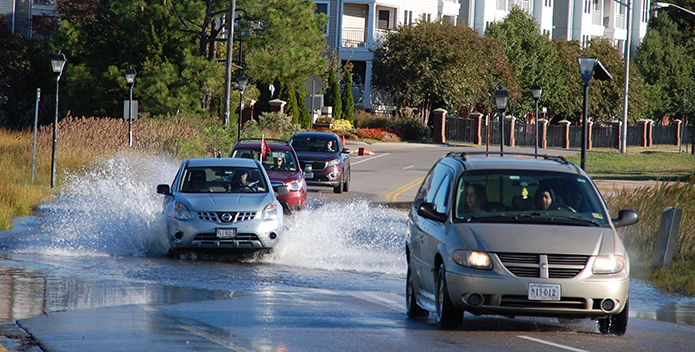This was first published in The Virginia-Pilot.
With his recent executive order, Gov. Ralph Northam wisely directed the commonwealth to prepare for the inevitable impacts of climate change. He also told us to learn from places such as New Orleans and the Netherlands.
We can’t just build bigger levees, dikes or other one-dimensional solutions. To protect lives and property in Virginia, and to save taxpayer money, we must, as Northam said in his executive order: “Employ natural and nature-based solutions to the maximum extent possible.”
In Hampton Roads, rains and high tides already inundate our streets. We can slow down and soak up this flood water by turning parking lots into parks, by planting trees along streets, vegetation along our shorelines, and by building green roofs. These are the nature-based solutions the governor is talking about. This approach is cost-effective. It also provides numerous social benefits beyond dry basements.
New Orleans offers examples of what we might see in Virginia. The city, for instance, will soon break ground for the Mirabeau Water Garden, a 25-acre site of the former Convent of the Sisters of St. Joseph. The nuns donated their property after Hurricane Katrina, stipulating only that the city use the land to help people appreciate the holiness of water and land.
The Water Garden will look like a public park, complete with a series of landscaped ponds, maybe even a cypress forest. But it will play a much more important role, too. Like a giant retention pond, it will hold, then slowly release, 11 million gallons of stormwater that normally would overwhelm the city’s drainage systems during heavy rains. It will reduce neighborhood flooding by 40 percent, even in large storms.
While this will be a significant investment, it will pay for itself many times over. A team of experts last year concluded that the project will provide economic and social benefits valued at five times the cost of construction and maintenance. Natural solutions such as this improve property values, cool neighborhoods in hot summers, filter polluted runoff, offer recreational opportunities and provide other benefits.
Cities in our region are soaking up such lessons. Following New Orleans’ example, both Norfolk and Hampton invited officials from the Netherlands to better understand what that country learned from living below sea level. The Dutch message: “Embrace” water rather than fight it. Soak it up.
Resiliency plans for both Norfolk and Hampton now call for such an approach. For example, Norfolk already has installed several “living shorelines” that incorporate marshland to control erosion. The city just completed a major living shoreline along the Lafayette River just upstream from the Virginia Zoo. Norfolk and the state are now working together to reduce costs and expedite permitting for these natural waterfronts.
Just across the bridge-tunnel, Hampton’s resilience plan mentions a possible large-scale “green infrastructure” project downtown similar to the Water Garden in New Orleans.
Not all projects can be large-scale. We all must contribute in our small way. Think victory gardens. Those were the backyard efforts in the United States, Britain and other Allied countries during the world wars to grow fruits and vegetables on a massive scale to help the war effort. It worked. We need a similar grass-roots movement here in Virginia: turn our lawns and highway median strips into “rain gardens” that slow down and soak up runoff; plant tens of thousands of trees along streets and streams; accelerate the restoration of oyster reefs which act as natural buffers to storm surge.
All of this will take a concerted effort, and considerable funds. Thankfully, Northam has recognized the need to contribute. Virginia’s Coastal Resiliency Fund would be the perfect source. It was designed to help communities adapt to sea-level rise. But the fund is empty, without any revenue.
An important next step to investing in resiliency is for Virginia to join the Regional Greenhouse Gas Initiative (RGGI)—a coalition of Atlantic Coast states that cap carbon emissions from power plants and require polluters to buy emission credits. This is a market-driven solution to reducing greenhouse gas emissions. The credits could provide much-needed revenue for the Coastal Resiliency Fund. This sort of funding is needed to scale up the greening of our urban landscape.
Fortunately, Northam is taking steps to prepare Virginia for entering RGGI. Joining Maryland, Delaware and other states in RGGI will provide an investment that pays off not only in reduced flooding, but in multiple social benefits.
The commonwealth must take a holistic approach to protecting our neighborhoods from climate change. Let’s embrace water rather than simply arming ourselves against it.
Harry Lester, Chairman of the Board of Trustees for CBF
Issues in this Post
Climate Change Air Pollution Chesapeake Clean Water Blueprint Eastern Oysters Land Use Runoff Pollution Restoration Sea-Level Rise Water Quality CBF in Virginia Hampton Roads Office Virginia Office, Richmond



